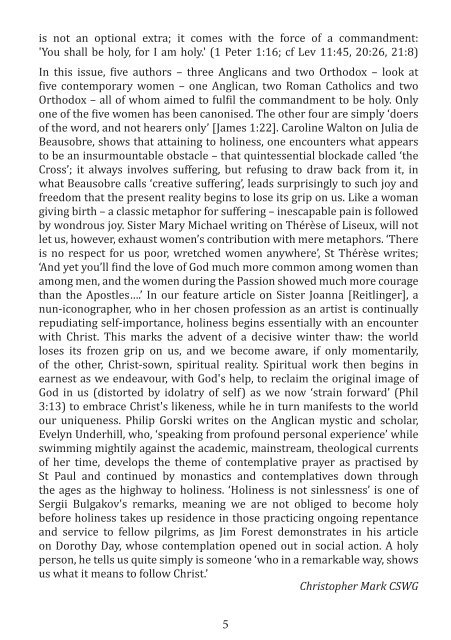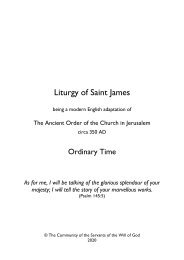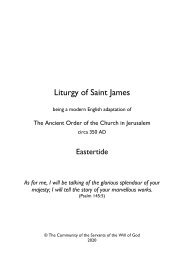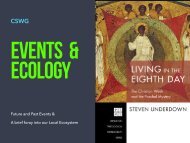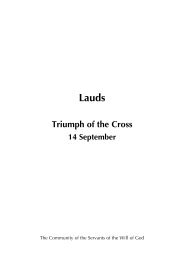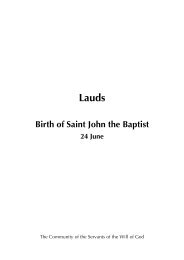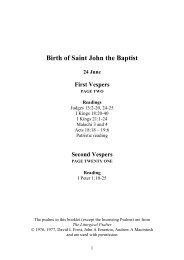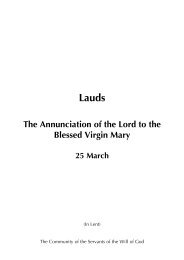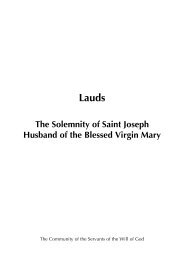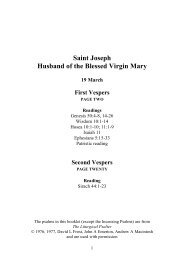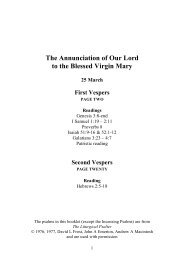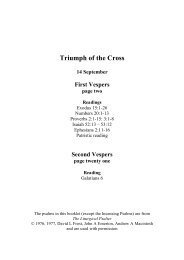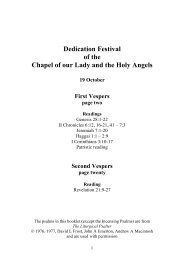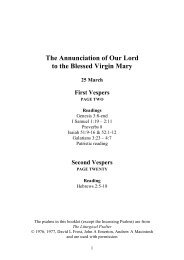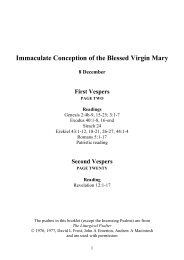In Praise of Holy Women
'Come to the Father' is the official journal of the Anglican Community of the Servants of the Will of God, Sussex, England, a contemplative monastic order for men and women founded in 1938. The aim of the journal is to maintain a dialogue between the Churches - East and West. This issue features articles on Evelyn Underhill, Julia DeBeausobre, Therese of Lisieux, Sister Joanna Reitlinger and Dorothy Day.
'Come to the Father' is the official journal of the Anglican Community of the Servants of the Will of God, Sussex, England, a contemplative monastic order for men and women founded in 1938. The aim of the journal is to maintain a dialogue between the Churches - East and West. This issue features articles on Evelyn Underhill, Julia DeBeausobre, Therese of Lisieux, Sister Joanna Reitlinger and Dorothy Day.
You also want an ePaper? Increase the reach of your titles
YUMPU automatically turns print PDFs into web optimized ePapers that Google loves.
is not an optional extra; it comes with the force <strong>of</strong> a commandment:<br />
'You shall be holy, for I am holy.' (1 Peter 1:16; cf Lev 11:45, 20:26, 21:8)<br />
<strong>In</strong> this issue, five authors – three Anglicans and two Orthodox – look at<br />
five contemporary women – one Anglican, two Roman Catholics and two<br />
Orthodox – all <strong>of</strong> whom aimed to fulfil the commandment to be holy. Only<br />
one <strong>of</strong> the five women has been canonised. The other four are simply ‘doers<br />
<strong>of</strong> the word, and not hearers only’ [James 1:22]. Caroline Walton on Julia de<br />
Beausobre, shows that attaining to holiness, one encounters what appears<br />
to be an insurmountable obstacle – that quintessential blockade called ‘the<br />
Cross’; it always involves suffering, but refusing to draw back from it, in<br />
what Beausobre calls ‘creative suffering’, leads surprisingly to such joy and<br />
freedom that the present reality begins to lose its grip on us. Like a woman<br />
giving birth – a classic metaphor for suffering – inescapable pain is followed<br />
by wondrous joy. Sister Mary Michael writing on Thérèse <strong>of</strong> Liseux, will not<br />
let us, however, exhaust women’s contribution with mere metaphors. ‘There<br />
is no respect for us poor, wretched women anywhere’, St Thérèse writes;<br />
‘And yet you’ll find the love <strong>of</strong> God much more common among women than<br />
among men, and the women during the Passion showed much more courage<br />
than the Apostles….’ <strong>In</strong> our feature article on Sister Joanna [Reitlinger], a<br />
nun-iconographer, who in her chosen pr<strong>of</strong>ession as an artist is continually<br />
repudiating self-importance, holiness begins essentially with an encounter<br />
with Christ. This marks the advent <strong>of</strong> a decisive winter thaw: the world<br />
loses its frozen grip on us, and we become aware, if only momentarily,<br />
<strong>of</strong> the other, Christ-sown, spiritual reality. Spiritual work then begins in<br />
earnest as we endeavour, with God's help, to reclaim the original image <strong>of</strong><br />
God in us (distorted by idolatry <strong>of</strong> self) as we now ‘strain forward’ (Phil<br />
3:13) to embrace Christ's likeness, while he in turn manifests to the world<br />
our uniqueness. Philip Gorski writes on the Anglican mystic and scholar,<br />
Evelyn Underhill, who, ‘speaking from pr<strong>of</strong>ound personal experience’ while<br />
swimming mightily against the academic, mainstream, theological currents<br />
<strong>of</strong> her time, develops the theme <strong>of</strong> contemplative prayer as practised by<br />
St Paul and continued by monastics and contemplatives down through<br />
the ages as the highway to holiness. ‘Holiness is not sinlessness’ is one <strong>of</strong><br />
Sergii Bulgakov's remarks, meaning we are not obliged to become holy<br />
before holiness takes up residence in those practicing ongoing repentance<br />
and service to fellow pilgrims, as Jim Forest demonstrates in his article<br />
on Dorothy Day, whose contemplation opened out in social action. A holy<br />
person, he tells us quite simply is someone ‘who in a remarkable way, shows<br />
us what it means to follow Christ.’<br />
Christopher Mark CSWG<br />
5


